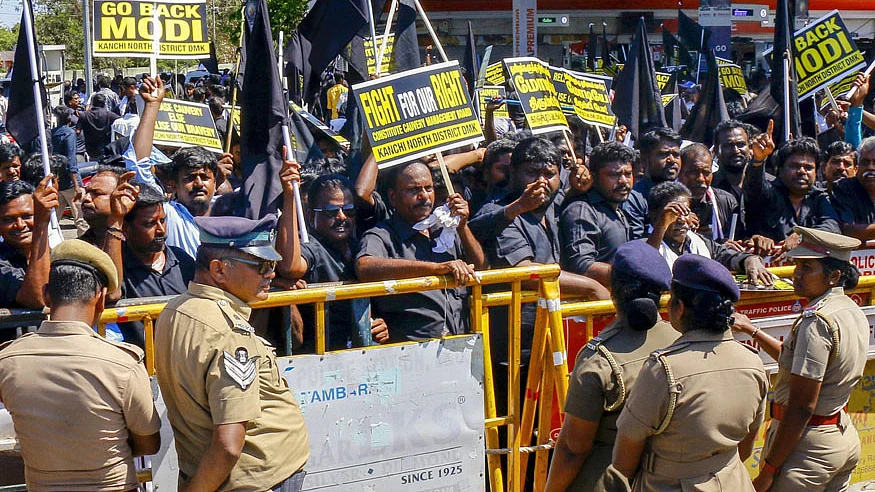Opinion
#GoBackModi: A few black balloons shattered Modi’s myth
Modi should stop claiming that “125 crore Bharatwasis” are with him. That is simply not true—not in Tamil Nadu, Kerala, Telangana, Andhra Pradesh. The people of Karnataka will reveal their stand soon

Black flags have been raised against other Prime Ministers in the past. But it is probably the first time that black balloons were seen floating in the Chennai sky as Narendra Modi's helicopter airlifted him directly from the airport to the IIT Madras campus.
Thanks to the helicopter, the Prime Minister was able to avoid the street protests all along the 15 km route, but he could not evade the symbolic significance of the dark clouds of discontent in Tamil Nadu, where almost every Opposition party and activist group took part in the demonstrations.
A sense of deep-seated anguish and antagonism prevailed throughout the day on Thursday, on the streets and social media too. Cyberspace was buzzing with tweets with the hashtag #GoBackModi.
The Central government’s strange insensitivity to Tamil Nadu’s water woes and reluctance to solve the Cauvery waters dispute was lambasted and Modi himself was personally targeted.
Such was the volume and intensity of the storm of online messages and posts, that it quickly alerted India watchers abroad. Many global news sites and international online newspapers reported that “the hashtag #GoBackModi has become the top worldwide trend on Twitter”.
It was also reported that Facebook and Instagram users shared pictures from citywide protests in Chennai, demanding action on the Cauvery water distribution issue.
It became clear that Narendra Modi’s popularity as Prime Minister has taken a dip. Discontent is boiling over in Tamil Nadu specifically because of the Modi government’s failure to act on a Supreme Court direction to set up the Cauvery Management Board and a Cauvery Water Regulatory Committee.
One Twitter user posted photographs of the street protests showing a child holding a black flag and another of a group of black-shirted men carrying black balloons. She wrote: “This is how Tamil Nadu welcomed PM Modi. #GoBackModi is trending at No 1, it also shows why you shouldn’t underestimate the power of South Indians.”
In both the on-ground and online outbursts of fury, two basic themes were predominant—that the BJP’s political calculations and compulsions during the ongoing Karnataka assembly elections are behind the Modi government’s deliberate delay in obeying the court order; and that southern States as a whole are getting step-motherly treatment because the BJP-led NDA government is dominated by parties of the North.
Both these public perceptions are potentially dangerous, especially the growing feeling that even within the NDA ruling coalition, southern partners are given short shrift—the recent exit of the Telugu Desam Party of Andhra Pradesh being the obvious and most clinching evidence of this bias.
Published: undefined
One Twitter user posted photographs of the street protests showing a child holding a black flag and another of a group of black-shirted men carrying black balloons. She wrote: “This is how Tamil Nadu welcomed PM Modi. #GoBackModi is trending at No 1, it also shows why you shouldn’t underestimate the power of South Indians”
This means another of the slogans coined by Modi—“Cooperative Federalism” — is a lie. Nor does it bode well for the unity of the country or for inequitable development and healthy democracy.
Lending credence to this rather bleak line of thinking is the fact that in Kerala relations between the Centre and state government are currently at flash point, resulting not only in mutual recriminations between the BJP and the Left parties but also violence and bloodshed.
In Karnataka, too, there are indications that fanning the flames of communal and caste discord is an intrinsic element of BJP’s electoral strategy. Apprehensions are also growing that if, as seems likely, Modi and Amit Shah fail to swing a majority of voters to their side, the people of the State would soon face the backlash of vengeance.
As a result of the rising disquiet and distrust among the people of the southern States, Narendra Modi’s oft-repeated claim he enjoys the support of 125 crore Indians now rings more hollow than it ever did.
South India, consisting of Tamil Nadu, Karnataka, Kerala, Andhra Pradesh and Telangana as well as the Union territories of Puducherry, Andaman & Nicobar and Lakshadweep, occupies about 20 per cent of India's land area. The population is also estimated at more than one-sixth of the total.
It would be politically and electorally disastrous for the BJP to ignore this reality. It would be even more catastrophic for the country.
Right now, it does appear that Narendra Modi’s personal popularity is not high in any of the southern States. The black flag, balloons and demonstrations in Chennai on Thursday only underline this assessment.
At the very least, Modi would be well-advised to stop claiming in his orations, especially when he travels abroad, that “125 crore Bharatwasis” are behind him. That is simply not true—not in Tamil Nadu, Kerala and Andhra Pradesh. The people of Karnataka will soon reveal where they stand.
Published: undefined
Follow us on: Facebook, Twitter, Google News, Instagram
Join our official telegram channel (@nationalherald) and stay updated with the latest headlines
Published: undefined